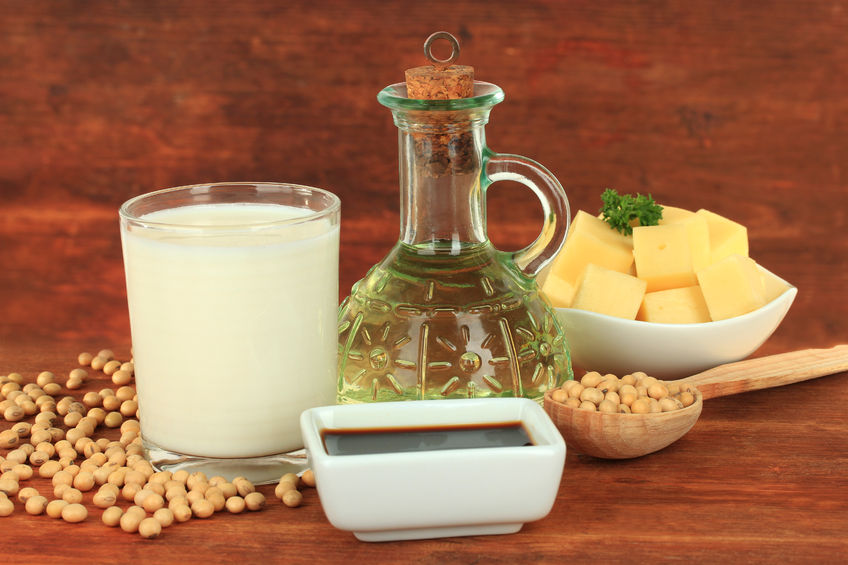It might surprise you to learn that soy beans and the products made from them are not as healthy as you might have been lead to believe.
There is soy in countless food items such as protein powders, meat substitutes, tofu, pastas, frozen meals, dairy substitutes such as milk and ice cream, almost all processed foods, and even infant formula.
There have been decades of studies proving the negative health consequences of consuming soy, and yet it is still consumed and heavily marketed as a health food. (1) Here are the 7 reasons why soy is not a food humans should be consuming.
1. Soy beans contain large amounts of natural toxins called “anti-nutrients.”
While all plants have some natural defenses, soy beans are especially well protected. They contain compounds called phytates, lectins, oxalates, enzyme inhibitors, and goitrogens which protect the plant from insects and from being infected by bacteria, viruses, or fungi. (2) It is because of these anti-nutrients that soy is toxic to our system, is extremely hard for our digestive systems to breakdown, and why we are unable to utilize the few nutrients that are present. It is the bean’s natural immune system fighting back!

2. Soy prevents you from absorbing and digesting other nutrients in your diet.
The compound phytate interferes with the absorption of minerals such as calcium, iron, magnesium, and zinc. This means that drinking a glass of soy milk with your meal will prevent your body from absorbing many of the nutrients present in your food. It also contains enzyme inhibitors. You need enzymes in order to break down and digest your food. When those enzymes are inhibited, your body has a very difficult time digesting protein, carbohydrates, and fat. For this reason, a diet high in soy products can lead to malnutrition.
3. Most soy in this country is made from genetically modified (GMO) soy crops.
While there is strong debate on the safety of genetically modified crops themselves, there is overwhelming evidence that the synthetic pesticides and herbicides used on these crops are extremely harmful to our health and the health of our planet. GMO crops work one of two ways. They have foreign genes inserted into their DNA that either allows them to withstand heavy doses of these herbicides without dying, or it gives the plant a trait that causes insects’ stomachs to explode when they try to eat them. Since the introduction of GMO soy seeds, the number of consumers with a soy allergy has skyrocketed. (3)
4. Soy is a hormone disruptor.
It contains phytoestrogen, which mimics estrogen in the body and can contribute to reproductive problems for men and women, as well as contribute to breast cancer and other cancers. It also contains compounds called goitrogens which can block the production of thyroid hormone, can cause thyroid disorders, interferes with iodine metabolism, and leads to goiter formation. (4)
5. Soy infant formulas put your baby’s health at risk.
The amount of estrogen in one day’s worth of soy formula is the equivalent of five birth control pills. Infants fed soy formula have up to 20,000 times more estrogen in their bodies than babies that are breast fed or fed non-soy containing formulas. This extreme amount of estrogen can harm a baby’s brain development, immune system development, and reproductive development. Nursing mothers should not be consuming soy products for this reason as well. (5)
6. Soy derivatives are used in most processed foods.
Soybean oil is cheap. It is a polyunsaturated fat that is used to make trans-fats such as margarine and shortening. It also has a long shelf life, making it perfect for those brightly colored boxed and packaged items at the grocery store. Highly processed food, most of which contains some soy derived food additive, is cheap, has an unnaturally long shelf life, and dangerous for your health. A common soy additive is an emulsifier called soy lecithin.
7. Soy is bad for the planet.
Much of the soy produced in the US is fed to cattle, chicken and other livestock. Not only is it harmful to the animals health, but these harmful properties are passed on into the meat, eggs, and milk and dairy products that we consume. Soy crops also strip the soil they are planted in, leaving it nutritionally depleted.
The only soy that you should ever eat is soy that is ORGANIC and FERMENTED. The fermentation process breaks down the anti-nutrients present in the soy bean and increases the bio-availability of the nutrients present. Organic soy guarantees that the seeds were not GMO. Fermented soy products include miso, natto, tempeh, and soy sauce that is fermented traditionally with salt and enzymes.
References:
1. http://www.westonaprice.org/health-topics/studies-showing-adverse-effects-of-dietary-soy-1939-2008
2. Dee McCafferey, CDC, The Science of Skinny (Boston Massachusetts, 2012), 150-153.
3. Hye-Yung Yum, Soo-Young Lee, Kyung-Eun Lee, Myung-Hyun Sohn, Kyu-Earn Kim, “Genetically Modified and Wild Soybeans: An immunologic comparison,” Allergy and Asthma Proceedings 26, no. 3 (May¬June 2005): 210-216(7).
4. http://wellnessmama.com/3684/is-soy-healthy
5. http://articles.mercola.com/sites/articles/archive/2010/09/18/soy-can-damage-your-health.aspx











